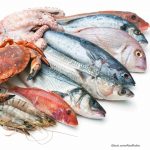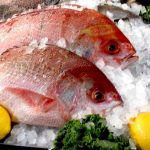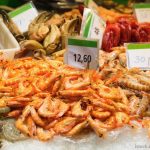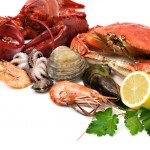A federal court ruled this week that the U.S. Seafood Import Monitoring Program is upheld. This program requires that some imported seafood that is at risk of illegal, unreported, and unregulated (IUU) fishing and seafood fraud is completely documented and traced from the fishing vessel or farm to the U.S. border. This program, also known as the Seafood Traceability Rule, takes effect January 2018. It will require importers of seafood such as tuna, grouper, swordfish, red snapper, and blue crab to provide specific information to border inspectors before their products can enter the country. Beth Lowell, senior director for illegal fish and seafood fraud at Oceana said in a statement, "This ruling is a huge win for U.S. fishermen and consumers who are cheated when illegally caught … [Read more...]
Oceana Finds Seafood Fraud Worldwide
Oceana has released a report about seafood fraud around the world. The report, called Deceptive Dishes: Seafood Swaps Found Worldwide, states that seafood fraud is a serious global problem that threatens consumer health. The review looked at data in 2014, and it shows some promising trends because of recent regulations in the European Union (EU) that are "increasing transparency and traceability as well as addressing illegal, unregulated, and unreported (IUU) fishing." The report states that if the United States adopts comprehensive, full-chain traceability, it will be more difficult for consumers to be misled. The report states that on average, one in five of more than 25,000 samples of seafood tested was mislabeled. Oceana reviewed more than 20 published studies from 55 … [Read more...]
Flaws Found in Seafood Traceability Rule
Oceana released a report last week revealing shortfalls in the Obama administration's proposed traceability rule to address seafood fraud in this country. The rule does not increase transparency for most of the seafood sold in the U.S. Oceana believes it should be expanded to include all seafood through the full supply chain. Seafood fraud is any illegal activity that misrepresents seafood at the market. Mislabeling can hide illegal, unreported, and unregulated fishing (IUU) that depletes fisheries, threatens wildlife on the brink of extinction, and stresses the ocean's ecosystems. It also cheats consumers and may hurt people who buy mislabeled products and are allergic to them. Antibiotics and pesticides may be used in industrial farming operations, but seafood may be labeled as … [Read more...]
North Carolina Seafood Processor Sentenced
Alphin Brothers Inc.,a seafood processor and wholesale distributor in North Carolina, was sentenced this month in federal court for falsely labeling imported shrimp. An employee purchased shrimp on the company's behalf and directed employees to falsely label farm-raised imported shrimp as a wild-caught product of the U.S. This mislabeled product was sold by Alphin Brothers to customers in Louisiana through interstate commerce. The facility was ordered to pay a criminal fine of $100,000 and to forfeit about 21,450 pounds of shrimp. The company will also serve three years of probation. And they must implement a training program to educate employees on federal labeling requirements and laws. Those federal laws require seafood retailers to provide consumers notice of the country of … [Read more...]
Presidential Task Force Against Seafood Fraud
Today, a task force created by President Obama released a set of strong recommendations to stop seafood fraud and illegal fishing. Oceana applauds this move, stating that this is a "real step forward in fighting illegal fishing and seafood fraud in the U.S. and around the world. The task force reaffirms the president's commitment to stop these crimes that provide profits to pirate fishermen, rip off consumers, and hinder ocean conservation." The task force was established in June 2014. Agencies were told to work together for six months to develop the recommendations. Oceana also says that to protect consumers, the link between U.S. dollars and pirate fishing must be broken. The task now is to make sure these measures are implemented. Boat-to-plate traceability is necessary to make … [Read more...]
Public Comments on Seafood Fraud Task Force Ask for Traceability
In June 2014, the White House announced a Presidential Task Force on Combating Illegal, Unreported and Unregulated Fishing and Seafood Fraud and asked for comments from the public to develop recommendations. Oceana, one of the groups commenting on the proposal, has long advocated for traceability to help combat seafood fraud. That fraud consists of mislabeling and deliberately misnaming seafood in order to receive a higher price for the product in the marketplace. Some facilities substitute lesser quality species for more desirable fish, which can lead to allergic reactions and other health problems. Some of the species substituted for higher quality fish are higher in heavy metals such as mercury, which can cause serious illness. When farmed fish are substituted for wild-caught … [Read more...]
President Obama Tackles Seafood Fraud and Illegal Fishing
Oceana has released a statement that President Obama is going to work on seafood fraud and illegal fishing in the United States. The announcement was made at the global "Our Ocean" conference hosted by Secretary of State John Kerry. The President is directing federal agencies to develop a comprehensive program to combat seafood fraud. Food Poisoning Bulletin has told you about seafood fraud for the past few years. Many types of seafood are mislabeled, which can lead to illness and allergic reactions. In addition, cheap varieties of fish are often dishonestly sold as more expensive varieties, which costs consumers millions of dollars every year. Oceana's campaign director Beth Lowell said in a statement, "President Obama's announcement is an historic step forward in the fight against … [Read more...]
Oceana Map Details Seafood Fraud Around the Country
A new map published by Oceana details the seafood fraud in the United States. Food Poisoning Bulletin has told you about seafood fraud before; it is a serious problem all over the world. Many consumers pay more for seafood than they should; species are sold masquerading as other species which costs consumers money and puts those with allergies at risk; and some of the species substituted for more pricey varieties can make you sick. The map lets you enter a location to discover fraud in your area. And information in the map tells you about Oceana studies. For instance, the largest study of seafood fraud to date found that 1 in 3 species is mislabeled. The agency has tested seafood and shellfish all around the country. They found that Atlantic cod is often mislabeled and sold as "orange … [Read more...]
New Study Finds Illegal Seafood Imported Into U.S.
A new study published in Marine Policy estimates that between 20 and 32% of wild-caught seafood imported into this country comes from illegal, unregulated and unreported fishing (IUU), also called "pirate" fishing. These illegal imports are valued between $1.3 and $2.1 billion, in a $16 billion market. Pirate fishermen fish in closed areas, during prohibited fishing times, and use illegal gear to catch threatened species. Since 85% of our commercial stocks are fished "up to their biological limits or beyond" according to the report, IUU threatens the sustainable use of our oceans. Fishing in the oceans needs to be regulated to maintain the sustainability of the waters. Illegal fish products are mixed into supply chains when they are processed, which further muddies the situation. The … [Read more...]
CA State Senator Drafts Bill To Curb Seafood Fraud
Citing reports of widespread seafood mislabeling,California State Senator Alex Padilla has drafted a bill aimed at curbing seafood fraud and improving consumer choice. SB 1138, which would make it illegal to knowingly sell mislabeled seafood, is scheduled to be heard by the Senate Health Committee this afternoon. In a press conference announcing the bill, Padilla cited a recent Oceana survey that revealed Southern California leads the nation in mislabeled fish. The survey found fish mislabeled in: 84 percent of sushi samples in Southern California; 58 percent of restaurants in Northern California; 52 percent of all fish in Los Angeles and Orange Counties; 27 percent of grocery stores visited in Northern California. Seafood mislabeling puts consumers at risk when they think they are … [Read more...]









